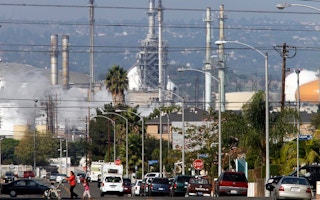The head of the Californian emissions trading scheme – which will ultimately become the world’s third largest – says the US state has no plans to link with Australia’s carbon price.
Mary Nichols, chairman of the California Air Resources Board and recently named one of TIME Magazine’s 100 most influential people in the world, said the state introduced a scheme this year to place a limit on its greenhouse gas emissions and give businesses an opportunity to come up with their own ways to reduce emissions at lowest cost.
Though she is in Australia to meet local officials, Ms Nichols said in an interview with Fairfax Media and in an address at the State Library of Victoria on Wednesday that the two governments were not discussing linking their emissions trading schemes – in part because of uncertainty over the future of the Australian system.
”I can’t say at the moment it would be a very good time to be discussing linking with Australia when the future of the program is in question, at least it has been raised as an election issue,” she said to the audience at the State Library.
”But beyond the politics, the philosophy behind the programs and the approach … are just different enough that I think to go to a full linkage discussion would be very difficult.”
While linkage was not on the table, Ms Nichols signed a memorandum of understanding with Australia’s Clean Energy Regulator on Tuesday to share their experiences of operating carbon markets.
Ms Nichols said discussions with Australian officials had also examined common approaches to upcoming international climate change talks.
”We have some very common interests, but that doesn’t mean we have an interest in linking,” she said.
Australia has already established a link with the European Union’s emissions trading scheme – the world’s largest – which is struggling with low carbon prices.
The EU link will mean Australia’s carbon price will likely crash from $25.10 a tonne to about $6 when the current fixed price ends and trading starts in either 2015 or – if Prime Minister Kevin Rudd wins the election and gets his way – next year.
Ms Nichols said California’s immediate priority was to link schemes with the Canadian province of Quebec next year. She said the two governments had worked for many years to ensure the two schemes were effectively the same.
California – considered the world’s 10th largest economy – has committed to cutting its emissions to 1990 levels by the end of the decade, and by 80 per cent by 2050.
Californian emissions permits are current selling at $15 a tonne. Its scheme covers about 350 companies. It is expected to be the third largest scheme in the world once it expands in 2015.
Ms Nichols said California wanted to have the most stringent carbon market in the world to ensure investor confidence and also claim a leadership role in making cap-and-trade schemes work.
She said California only allowed limited use of offset credits.
Unlike Australia, California has shunned the use of offsets from the United Nations global market under which credits are generated from building low-emissions projects in developing countries such as China. Its offsets can be developed from only US domestic projects in a narrow band of fields.
She said Australia had strongly focused on achieving emissions cuts at the lowest cost. But California’s approach to offsets – while still conscious of cost – was about ensuring the most verifiable environmental outcomes possible.
California is one of 10 US states with emissions trading schemes. Nine north-eastern states are involved in a more modest schemes covering power plants.
While US President Barrack Obama has voiced support for carbon pricing, opposition in Congress makes the adoption of a national program impossible for the foreseeable future.
Instead, Mr Obama recently announced he would pursue a suite of other measures including directing the Environmental Protection Agency to set emission standards for existing coal-fired power plants.
Ms Nichols described the the ferocious political debate in Australia over carbon pricing – which the Coalition has bitterly opposed under opposition leader Tony Abbott – as ”amazing”.
”We think of Australia as a kind of calm, quiet place normally, but apparently not,” she said.
She said California has also had a strong public debate over emissions trading but a 2010 public ballot to delay the scheme until better economic times had been defeated.
”These programs [carbon markets] are quite technical. They are easy to misrepresent,” she said.
Court action against the Californian scheme is still pending, with industry trying to force the government to hand out all of the carbon credits for free rather than auction them.










